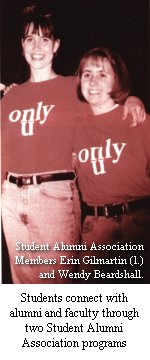
Professionally Speaking
 Scenario one: a lively dinner party at the home of a local alumnus,
with participants chatting about the day's news, a recent movie, or a
memorable vacation. Then the participants – U alumni, faculty, and
students – turn to another topic: grade inflation. Disaster! One
of the students feels a lurch in her stomach as she eyes her biology professor
across the table. (I hope he's not talking about me, she thinks.)
But her concern quickly passes. After a few remarks from the professor
and the alumni at the table, the student voices her own opinion, finding
out that the occasion is one of discussion, not judgment. The other participants
listen enthusiastically to her remarks, and the discussion continues.
Scenario one: a lively dinner party at the home of a local alumnus,
with participants chatting about the day's news, a recent movie, or a
memorable vacation. Then the participants – U alumni, faculty, and
students – turn to another topic: grade inflation. Disaster! One
of the students feels a lurch in her stomach as she eyes her biology professor
across the table. (I hope he's not talking about me, she thinks.)
But her concern quickly passes. After a few remarks from the professor
and the alumni at the table, the student voices her own opinion, finding
out that the occasion is one of discussion, not judgment. The other participants
listen enthusiastically to her remarks, and the discussion continues.
Scenario two: a group of students, mainly job-minded seniors from a particular college, sits comfortably at the Alumni House listening to an alumna in their field present infor-mation about how she started her own business. Soon, the discussion focuses on questions regarding entry-level positions in the company and what these soon-to-be graduates might expect in the "real world." Both the alumna and the students learn of some new, significant prospects.
At a large commuter campus like the University of Utah, these scenarios may seem like pipe dreams or clips from an overly optimistic recruitment video. This is especially true considering the common perception that U students are apathetic and uninvolved in student life. But Student Alumni Association members disagree. Two of their programs, Alumni Dinners and Career Connections, work to bring students, faculty, and alumni together, providing all with an opportunity to explore common interests and concerns. From this, they learn to see the campus in terms of connections rather than divisions. While both programs rely on interaction, each serves a different function.
Bringing students, alumni, faculty, and staff together for a great meal and stimulating conversation is the purpose of an Alumni Dinner. There is no set agenda, no pre-selected topics, simply the opportunity for different members of the University community to swap ideas in a new, informal setting. The guests of the host alumnus quickly realize that what they have in common is the University. The result enhances everyone's sense of the U community.
Career Connections is intended to bring juniors and seniors together with alumni to fine-tune the students' career choices. Alumni provide students with real-world information that will make them better job candidates. Meanwhile, the alumni, while providing a great service to the students and their colleges, gain insights about prospective employees, their preparation, and their concerns.
Career Connections and Alumni Dinners are only two of the programs sponsored by the Student Alumni Assoc-iation. The goal of these programs is to enhance the students' University experience beyond the classroom. Aside from the information the participants receive, there is also the benefit of a free meal!
If you or a student you know would like to participate as host or guest in either of these two programs, please contact the Alumni Association at 801-581-3895. Events are open to all members of the University community.
– Erin Gilmartin, a senior majoring in history and political science, is vice president of the Student Alumni Association.
Copyright 1999 by The University of Utah Alumni Association